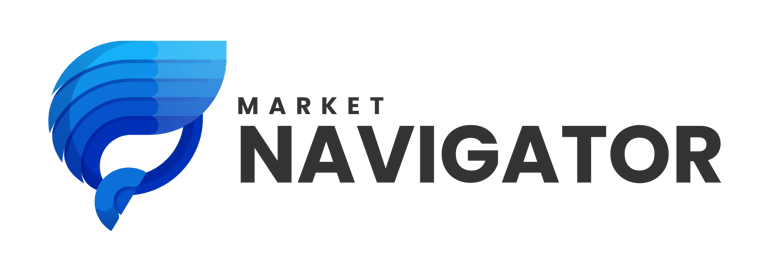Generative Engine Optimization (GEO)
In 2025, people don’t just search, they ask AI. Tools like ChatGPT, Perplexity, Gemini, and Bing Copilot are reshaping how users discover brands, get answers, and make decisions.
MARKETING
Omar Hisham
11/7/202511 min read
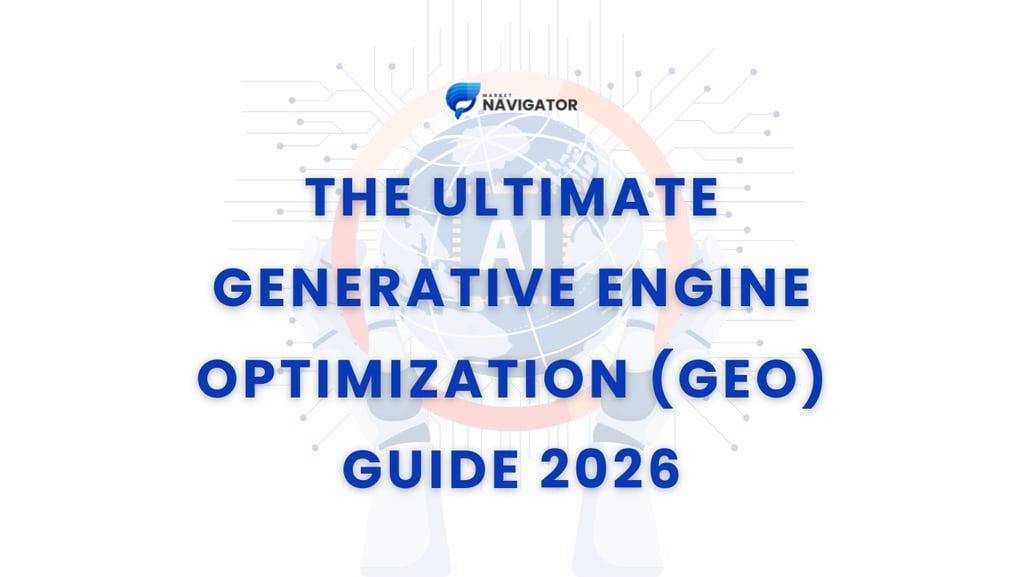

💡 What Is Happening In Search Algorithms?
Over 60% of online searches now start with AI chatbots or voice assistants instead of search bars.
Google’s Search Generative Experience (SGE) and AI-powered summaries are now influencing click behavior more than organic listings.
Businesses optimized only for traditional SEO are missing out on AI-generated visibility, a space where trust, structure, and factual clarity matter more than keywords.
🎯 Why This Article Matters
In this guide, you’ll learn:
What Generative Engine Optimization (GEO) actually means.
How AI search engines select content for their summaries.
Actionable steps to make your brand visible inside ChatGPT, Perplexity, Gemini, and other AI-driven results.
How Market Navigator’s AllSEO approach integrates GEO with SEO, AEO, and SSEO for maximum reach.
🧠 What is Generative Engine Optimization (GEO)?
Generative Engine Optimization (GEO) is the process of optimizing your content so it appears in AI-generated search results and summaries, such as those created by ChatGPT, Perplexity, and Google’s SGE.
It focuses on structured data, factual credibility, and contextual depth, allowing your brand to be cited by AI as a reliable source.
Unlike traditional SEO, which targets search rankings, GEO focuses on content credibility, structure, and factual reliability, making it easier for AI systems to recognize and reference your brand.
How Generative Engine Optimization (GEO) Works
AI search engines don’t crawl pages the same way Google does.
Instead, they learn from verified content, structured data, and trustworthy signals such as:
Author expertise and E-E-A-T elements
Citations and backlinks from authoritative domains
Schema markup and contextual clarity
Multilingual optimization for global relevance
When an AI tool generates an answer (e.g., “Best SEO companies in Dubai”), it references content that’s well-structured, semantically clear, and factually backed — and that’s exactly what GEO aims to achieve.
⚙️ SEO vs GEO
SEO helps you rank.
GEO helps you get referenced.
Why GEO Matters for Businesses in 2026?
✅ The Rise of “Answer-First” Search Experiences
In the AI-era of search, users increasingly expect immediate, complete answers, not just a list of links. Many queries are now answered within the search interface itself, which means your content may never get a click unless it’s structured for these new formats. For example:
Google Search Generative Experience (SGE) and other summary layers now appear in a growing percentage of queries.
These “answer-first” results shift user behaviour: less time spent clicking through, more quick answers given directly.
📉 AI Search Results Appearing Before Organic Links
Because AI-driven search summaries take prime screen real-estate (especially on mobile), traditional ranking and organic click-through rates are being disrupted. For example:
AI Overviews now take up about 42% of the screen on desktop and 48% on mobile in many results.
A study found that pages with AI-Overviews saw organic clicks drop by about 34%.
As one result, the “zero-click” phenomenon (where users find the answer without visiting a website) is rapidly increasing.
📈 How GEO Impacts Visibility, Trust & Conversions
Because AI-search presents answers directly, your visibility is no longer just about rankings, it’s about being referenced. Here’s how GEO changes the game:
Visibility: With GEO, being cited by AI or appearing in a summary means your brand is seen even if your page isn’t ranked #1.
Trust: AI systems tend to favour content that is structured, credible, and well-sourced. By focusing on those, you build stronger trust signals.
Conversions: While clicks may decline overall, when you are referenced by AI for high-intent queries (e.g., “best SEO agency Dubai”), the visitors you do get are more qualified, improving conversion potential.
Competitive advantage: In markets like Dubai and the GCC, early adopters of GEO (combined with bilingual & localized content) stand to capture visibility before the competition catches up.
🔍 Data Snapshot (2025)
AI Overviews now appear in approximately 11% of Google queries, with a year-on-year increase of around 22%.
Around 43% of consumers use AI tools daily, and 68% use AI for local product or service research — though only 19% fully trust AI results.
The rise of zero-click search means that traditional click-through metrics may shrink, which makes GEO visibility even more critical.
How Generative Search Engines Work?
Generative Search Engines (GSEs) like ChatGPT, Gemini, Perplexity, and Bing Copilot represent a major shift in how online information is discovered and delivered.
Instead of displaying ten blue links, these systems use Large Language Models (LLMs) to read, interpret, and summarize information from multiple trusted sources in real time.
🧠 1. The LLM-Driven Discovery Process
AI search engines don’t rely on traditional keyword crawling alone.
They analyze millions of web pages, databases, and verified sources to understand the context and intent behind a user’s query.
Through semantic indexing, they recognize patterns and relationships between concepts, not just phrases.
Example:
When a user asks “best SEO agencies in Dubai”, a generative engine doesn’t just look for that exact keyword — it seeks content that demonstrates:
Regional expertise (Dubai, GCC market context)
Proven authority (client results, testimonials, citations)
Clear, factual presentation (structured headings, schema, FAQ markup)
🔗 2. How AI Models Gather and Rank Information
AI engines rely on multiple layers of data signals to decide which sources to trust and include in their answers:
Structured data & schema markup — helps AI interpret key facts (name, service, location, author, etc.)
Credible citations & backlinks — build confidence that your content is accurate
Context-rich content — detailed, factual writing that explains why something is true, not just what it is
Freshness & authority — regular updates and verifiable authorship signal reliability to AI systems
Together, these help AI choose which websites get mentioned or cited in generated answers, essentially the “new Page 1” of search.
✍️ 3. The Role of Authorship, Accuracy & Semantic Clarity
Generative engines reward content that’s:
Authored by identifiable experts (with clear credentials)
Accurate and sourced (linking to authoritative references or data)
Semantically clear using concise, structured language that AI can parse easily
By combining these, you make your content machine-understandable and human-trustworthy, the core of Generative Engine Optimization (GEO).
Key Strategies for Generative Engine Optimization (GEO)
Generative Engine Optimization isn’t just about writing more content — it’s about writing content that AI systems can understand, verify, and cite.
Below are five key strategies Market Navigator uses to make brands visible inside AI-generated answers and summaries.
1. Create Credible, Structured Content
Generative search engines rely on context, clarity, and structure, not keyword stuffing.
To make your content machine-readable:
Use schema markup (FAQPage, Article, Organization) to help AI identify your brand, topics, and key facts.
Add citations and outbound links to reputable sources, they help large language models verify accuracy.
Incorporate FAQs and definitions so your page naturally answers conversational queries like “what is generative SEO?”.
Pro Tip: Use <h2> and <h3> headings logically; AI models use this structure to interpret topic hierarchies.
2. Build Context, Not Just Keywords
Traditional SEO focuses on exact-match keywords.
GEO, however, depends on semantic relationships (how ideas connect).
Create topic clusters: link related pages around a pillar topic (e.g., SEO → AEO → GEO → SSEO).
Write with intent alignment: explain concepts, provide examples, and show cause-and-effect reasoning.
Use entities and synonyms: (e.g., AI search optimization, LLM visibility, AI-driven SEO) to help LLMs understand breadth.
Result: Your brand is recognized as an authority on the topic, increasing the chance of citation in AI answers.
3. Optimize for LLM Readability
Large Language Models learn from text patterns.
They favor content that’s concise, factual, and unambiguous.
To optimize for LLM readability:
Keep sentences under 20 words.
Use bullet points, numbered lists, and bold text for clarity.
Avoid filler phrases and overly promotional language.
Include summary paragraphs under each heading for fast comprehension.
Think of AI readers as speed readers (your structure matters more than style).
4. Fact-Check and Source Authority
Generative engines prioritize verifiable and non-contradictory information.
To signal authority:
Link to government, academic, or data-driven sources when possible.
Maintain authorship transparency (bios, publication date, references).
Regularly audit outdated stats or claims; AI models penalize stale or inconsistent data.
If your company conducts original research, publish it with citations, LLMs heavily weight primary sources.
In short: factual consistency + credible sourcing = higher AI trust score.
5. Measure Mentions in AI Search Tools
Optimization doesn’t end at publishing; it continues through AI performance monitoring.
Track how and where your content is mentioned or cited inside generative platforms:
Use Perplexity.ai, Bing Copilot, or ChatGPT Search to see if your brand appears in citations.
Track changes in AI answer visibility as you update structured content.
Use tools like BrightEdge GPT Insights, Semrush One, Otterly, or Similarweb AI Radar tools to measure how often your site contributes to AI answers.
Goal: Not just clicks, but citations and mentions in AI answers that drive brand visibility.
Summary
To succeed in Generative Engine Optimization, focus on clarity, credibility, and structure.
Use schema, create semantically linked content, and maintain factual accuracy so AI systems can easily identify your content as a trustworthy source to cite.
GEO vs SEO: What’s the Difference?
Search visibility used to mean ranking higher on Google.
Now, visibility also means being referenced by AI engines that summarize the web into a single, trusted answer.
Here’s how Generative Engine Optimization (GEO) differs from traditional Search Engine Optimization (SEO) and why modern brands need both.
🔍 Search Focus
SEO: Focuses on improving web page rankings in search engine results (Google, Bing).
GEO: Focuses on making content discoverable and citable within AI-generated responses in ChatGPT, Gemini, or Perplexity.
⚙️ Core Mechanism
SEO: Driven by algorithms that rank pages using keywords, backlinks, and domain authority.
GEO: Driven by Large Language Models (LLMs) that analyze context, credibility, and semantic meaning.
🧱 Optimization Method
SEO: Uses on-page tactics (meta tags, keyword placement, title tags) and off-page strategies (backlinks, anchor text).
GEO: Uses structured data, clear authorship, factual citations, and semantic linking to help AI interpret and reference your content.
📚 Output Type
SEO: Produces ranked listings that users click on to visit a site.
GEO: Produces AI summaries or cited snippets that mention your brand directly in the AI’s response.
🤝 User Experience
SEO: Users browse multiple results to find information.
GEO: Users receive instant answers, so being cited is the only way to stay visible.
📈 Measurement of Success
SEO: Success is measured by organic traffic, click-through rate (CTR), and keyword rankings.
GEO: Success is measured by AI citations, brand mentions, and inclusion in AI-generated answers.
💡 Strategic Takeaway
SEO builds visibility. GEO builds trust.
In the AI-driven search era, your brand’s credibility in machine-interpreted content determines whether you’re mentioned at all.
How Market Navigator Implements GEO
At Market Navigator, Generative Engine Optimization isn’t just a concept — it’s built into everything we do.
Our AllSEO framework brings together SEO, AEO, GEO, and SSEO to help brands achieve visibility across every search surface, from Google and Bing to AI systems like ChatGPT, Perplexity, and Gemini.
1. The AllSEO Framework
We developed All Search Engine Optimization (AllSEO) to ensure our clients’ content performs in both traditional and next-generation search environments.
Each element supports a different layer of visibility:
SEO (Search Engine Optimization): Improves rankings and discoverability on Google and Bing.
AEO (Answer Engine Optimization): Structures content for voice and conversational queries on Siri, Alexa, and Google Assistant.
GEO (Generative Engine Optimization): Optimizes for AI-generated answers in ChatGPT, Gemini, and Perplexity.
SSEO (Social Search Optimization): Enhances visibility on social discovery platforms like TikTok, Instagram, and YouTube.
Together, they ensure your brand is findable, readable, and trusted — everywhere that matters.
2. Bilingual Optimization: English + Arabic
The UAE and GCC markets are bilingual by nature.
That’s why every Market Navigator project includes dual-language SEO and GEO implementation:
We create structured metadata and localized content in both English and Arabic.
We align brand tone and search intent across regional audiences.
Our team uses Arabic schema markup and NLP-friendly phrasing to ensure AI models understand your brand contextually, no matter the language.
This approach delivers visibility across Google MENA, ChatGPT Arabic, and regional AI tools increasingly used across the Gulf.
3. GEO Integration with UAE Brands
Our process for UAE-based clients follows a clear, data-driven workflow:
Step 1: Discovery & Audit
We analyze your current SEO structure, voice readiness, and AI visibility — identifying how your brand appears in AI summaries and local search results.
Step 2: Strategic Blueprint
We develop an AllSEO strategy, mapping your brand’s opportunities across GEO, AEO, and local search.
This includes content structure, data markup, and citation strategy.
Step 3: Implementation & Content Creation
Our team creates bilingual, AI-optimized content with schema integration, conversational FAQs, and factual sourcing — ready for generative indexing.
Step 4: Testing & AI Monitoring
We test your brand’s mentions across ChatGPT, Perplexity, and Bing Copilot using structured prompts, ensuring you’re cited in AI-generated results.
Step 5: Continuous Optimization
Monthly monitoring ensures your content adapts as algorithms and AI models evolve, keeping your brand visible in both traditional and generative search results.
💡 In Short
Market Navigator’s GEO process is designed to help UAE brands move from Invisibility or ranking to referencing — ensuring they’re trusted sources in the AI search ecosystem.
The Future of Search: GEO + AI Integration
The future of search isn’t about keywords; it’s about context, credibility, and connection.
As AI systems evolve, they’re reshaping how users find and trust information.
Generative Engine Optimization (GEO) is not a passing trend; it’s the foundation for how brands will be discovered in the AI-driven decade ahead.
1. Predictions for the Next 2–3 Years
Over the next few years, we’ll see search engines and AI platforms merge into one seamless discovery ecosystem. Here’s what’s coming:
AI-First Search Becomes the Default: Google’s AI Overviews, ChatGPT Search, and Perplexity will replace traditional result pages for many informational queries.
Citations as Currency: Brand trust will be measured not just by backlinks, but by how often AI systems cite your content as a source.
Multimodal Discovery: AI engines will interpret text, voice, and visual data simultaneously, making structured multimedia content vital for visibility.
Localized AI Results: AI systems will deliver region-specific answers, emphasizing geo-context, language, and cultural nuance.
In short: The search of the future isn’t about being clicked — it’s about being trusted and referenced by machines users rely on. Check out the latest SEO trends.
2. How GEO Complements AI Marketing, Personalization & Voice Search
GEO is the missing layer that connects AI marketing, personalization, and search optimization into one coherent system.
In AI Marketing: GEO ensures your content is discoverable inside AI-generated conversations and summaries, boosting brand credibility in automated recommendations.
In Personalization: AI engines draw on structured, semantic data to personalize results. GEO makes your content machine-readable so that it’s recommended to the right audience.
In Voice Search: GEO overlaps with Answer Engine Optimization (AEO), allowing assistants like Siri, Alexa, and Gemini Voice to pull accurate, contextual answers directly from your content.
Together, they create a unified visibility loop: Search → AI → Voice → Social → Conversion.
3. Why Early Adopters in the UAE Region Gain a Long-Term Edge
The UAE is moving rapidly toward AI-enabled commerce, smart search, and multilingual discovery.
Brands that embrace GEO early will:
Dominate AI-driven visibility across English and Arabic results.
Build trust equity — once AI models begin citing your content, they continue to do so as they evolve.
Gain market differentiation by appearing in AI summaries and voice-based answers where competitors are invisible.
Future-proof their marketing pipelines for AI integration, automation, and multilingual personalization.
In other words, GEO adoption in 2026 sets the foundation for AI authority in 2030.
Summary
The future of search combines GEO and AI to deliver trusted, personalized answers.
Brands that implement Generative Engine Optimization now will own visibility in the next generation of AI-driven discovery.
Conclusion
Search is no longer about rankings — it’s about recognition.
Generative Engine Optimization (GEO) represents the next phase of digital visibility, where brands are trusted not just by search engines, but by AI systems that now power everyday discovery.
By embracing GEO, your business ensures that:
Your content is readable and referenceable by AI engines like ChatGPT, Perplexity, and Gemini.
Your brand appears in AI-generated answers, not just organic listings.
You build long-term credibility and authority in the age of generative search.
🌐 Key Takeaways
GEO is the evolution of SEO — it focuses on AI visibility and brand trust.
Structured, factual content is now more valuable than keyword-stuffed pages.
Bilingual optimization (English + Arabic) ensures your brand connects with every audience in the UAE.
Early adoption gives you a lasting competitive advantage as AI discovery becomes mainstream.
🚀 Ready to Make Your Brand Discoverable Everywhere?
At Market Navigator, we help brands in the UAE and beyond appear in search engines, AI summaries, and voice-based discovery platforms through our unified AllSEO framework.
📈 Let’s position your business for the future of search — from Google to ChatGPT, from keywords to context.
📞 Take the Next Step
Book your AllSEO / GEO Consultation → marketnavigator.ae/contact
Learn more about our SEO Services → marketnavigator.ae/seo
Learn more about our ALLSEO → marketnavigator.ae/seo-geo-aeo-sso-in-2025
📧 Email: hello@marketnavigator.ae
📱 Phone: +971 55 6929 468
Looking for an experienced growth partner in the UAE?
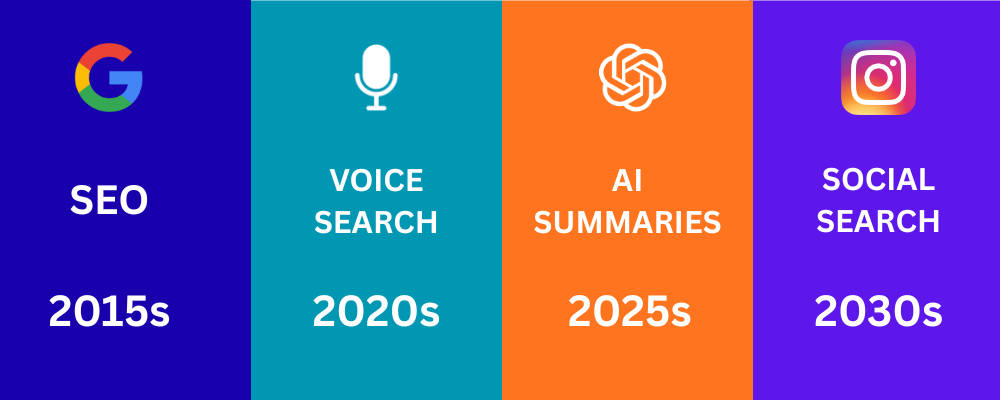

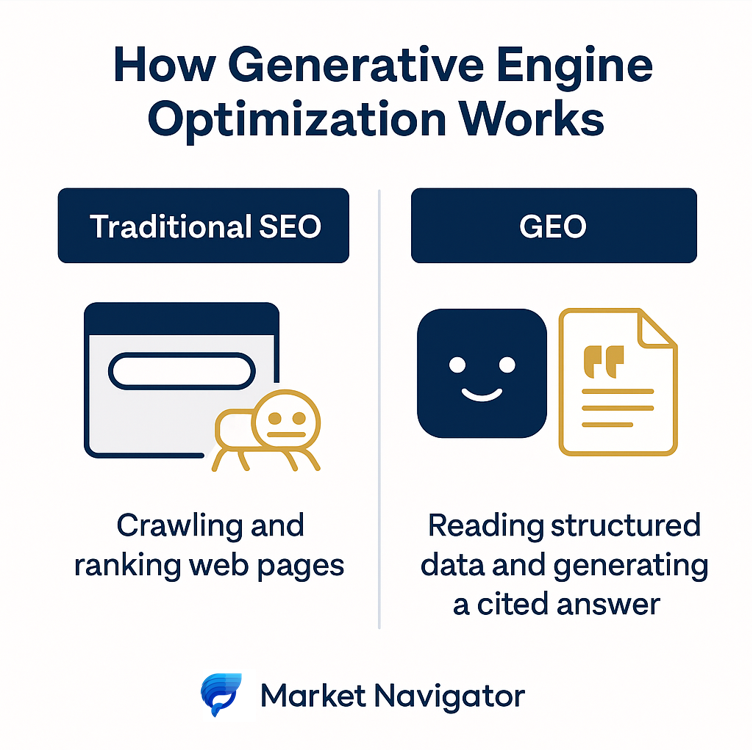

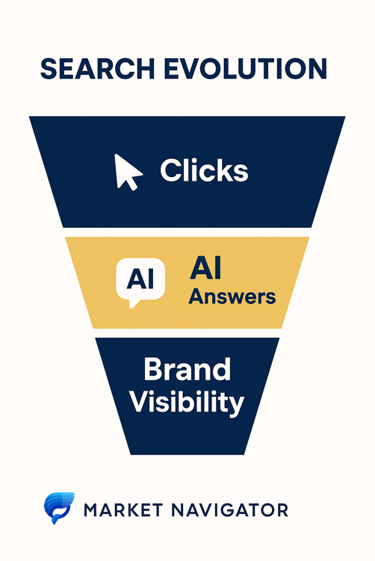

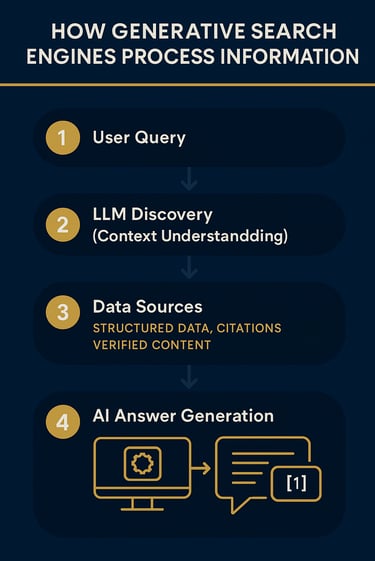

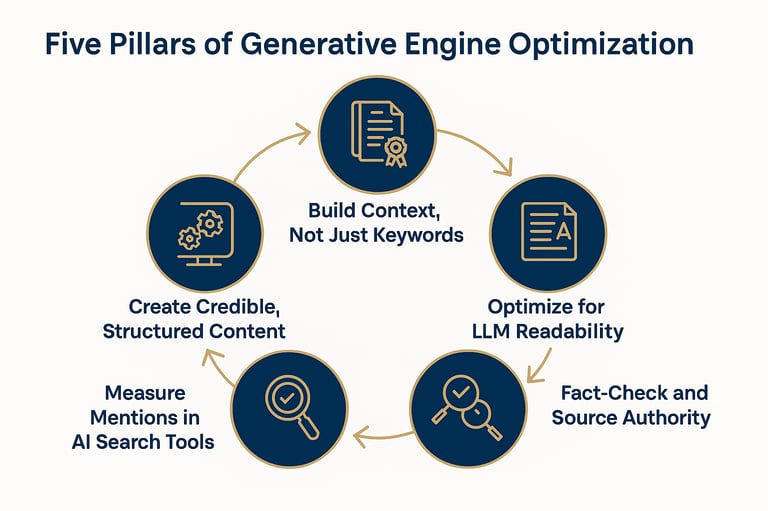

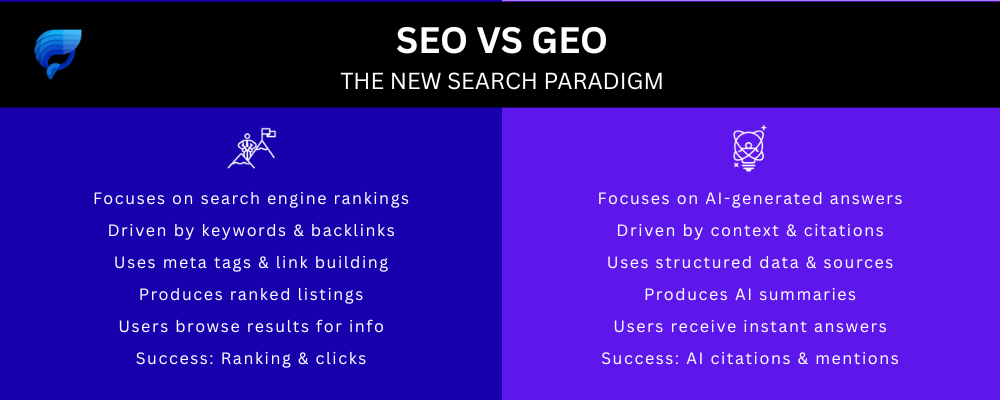

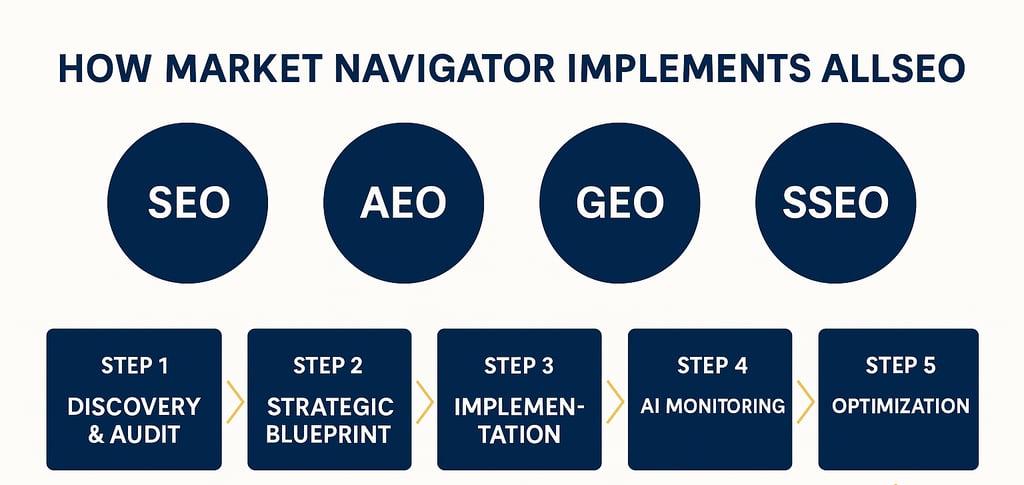

© 2025 Market Navigator. All Rights Reserved.
Meydan Grandstand, 6th floor, Meydan Road, Nad Al Sheba, Dubai, U.A.E
About Us
Market Navigator is a leading business consultancy specializing in business growth coaching and digital marketing. With a results-driven approach, we empower organizations to achieve their goals through strategic planning, innovative solutions, and seamless execution. Since inception, we have partnered with businesses across diverse industries, delivering measurable outcomes that enhance market impact and customer engagement. Based in Dubai, we bring regional expertise and a global perspective, making Market Navigator the trusted choice for impactful business transformation.
Market Navigator operates as Market Navigator LLC-FZ, a duly registered entity in Dubai. Our registration number is 2309561.
